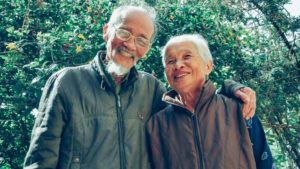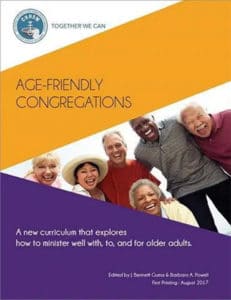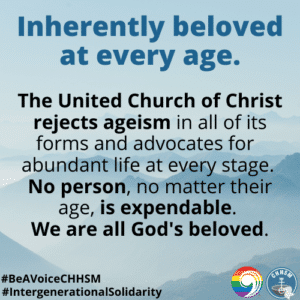Advocacy Toolkit: June Release Features Needs and Care of Older Adults
 The role of the church and its ministries in serving and advocating for the needs of older adults is the focus of the June installment of the Be A Voice Advocacy Health and Human Services Toolkit. A project of the UCC’s Council for Health and Human Service Ministries (CHHSM) and Justice and Witness Ministries (JWM) Washington, D.C., office, the toolkit provides personal stories of CHHSM members, historical and current context, helpful questions to ask candidates running for office, plus social media graphics and web resources links.
The role of the church and its ministries in serving and advocating for the needs of older adults is the focus of the June installment of the Be A Voice Advocacy Health and Human Services Toolkit. A project of the UCC’s Council for Health and Human Service Ministries (CHHSM) and Justice and Witness Ministries (JWM) Washington, D.C., office, the toolkit provides personal stories of CHHSM members, historical and current context, helpful questions to ask candidates running for office, plus social media graphics and web resources links.
The message of society-at-large is “that aging is about disease, decline, loss and diminished significance,” but that narrative must change, says the Rev. Beth Long-Higgins, executive director of the Ruth Frost Parker Center for Abundant Aging, part of United Church Homes, based in Marion, Ohio. “We are wasting the wisdom of [older adults’] experience and dishonoring the value of their life work when we fail to meet their needs in their later years.”
One focus of the Parker Center is to reimagine life for older adults and confront ageism. The current COVID-19 pandemic has created additional urgency, as some 80 percent of those who have died have been age 65 or older. A disproportionate number also have been from communities of color.

Age Friendly Congregations is a useful resource for local churches.
During the pandemic, “we have seen ageism rear its ugly head in suggesting that older individuals are expendable, and that trying to keep them safe at the expense of our economy is a waste,” Long-Higgins says. But serving older improves the lives of everyone, she says.
The Parker Center, which is highlighted in the Toolkit installment, not only helps UCH’s older adult communities, it also provides education and outreach to congregations on how they can change the way they view ministry to and with older adults. One resource in particular assists congregations in developing ministries for older adults. The Age-Friendly Congregations curriculum, co-authored by Long-Higgins and others and produced by CHHSM, helps congregations create their own Age-Friendly Covenants.
Older adults are an untapped source, Long-Higgins adds. “God created us to age … our capacity to be co-creators and contributors to the health and vitality of the community continues throughout our lives.”
The Advocacy Toolkit also provides information on older adults’ access to affordable housing and Medicaid services. In addition to UCH, many CHHSM members are at the forefront of advocating for and providing affordable housing and connections to Medicaid resources to older adults. According to the Build Healthy Places Network, only 35 affordable rental home exist for every 100 extremely low-income households, and 26 percent of those extremely low-income renters are older adults. Advocating for low-income housing (HUD-202) and no reductions in Medicare and Medicaid are essential to helping older adults thrive.

Social media graphics are part of the Toolkit.
Retirement Housing Foundation, based in Long Beach, Calif., is a CHHSM member with many affordable housing communities for older adults, persons with disabilities, and families. The Rev. Laverne Joseph, president, often reminds listeners of the dire need for affordable housing, especially for older adults. “There are 10,000 people a day turning 65 and, at one point, it is anticipated that half of them will need affordable housing,” he says. “RHF has approximately 22,500 residents, but we have over 37,000 persons on our waiting lists.”
Another CHHSM member — Phoebe Ministries, based in Allentown, Pa. — started the Phoebe Institute on Aging in 2001 in order to provide educational programs, cooperative ventures, and outreach activities that help promote quality of life and care for older adults and their families. A current focus of Phoebe’s advocacy work is assuring Medicaid increases for vulnerable older adults.
“The reality is that nursing homes in Pennsylvania have not received any increase in state Medicaid program funding — the largest payer of nursing home care — for the past five years,” says Scott Stevenson, president and CEO of Phoebe Ministries. “But inflation for health care has increased dramatically. In real dollars, this represents a loss of $632 million in the last year alone. Even the best nursing home providers cannot provide the highest quality care with diminishing funds.”
In addition to the Toolkit’s large selection of health care-related links providing information on serving older adults, a special expanded section of COVID-19 resource links is part of the June edition.
Join Our Mailing LIst
Follow on Facebook
Iredell Adult Day Services Hosts Ribbon-Cutting to Celebrate Adult Day Health Certification - CHHSM
www.chhsm.org
Iredell Adult Day Services (IADS) in Newton, N.C. — a nonprofit organization dedicated to caring for older adults, vulnerable groups, and their families, and part of EveryAge — hosted a ribbon cut...